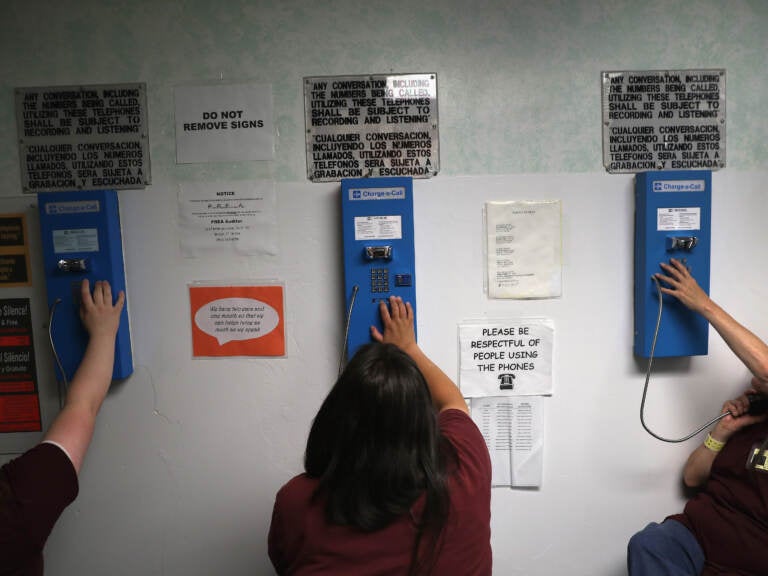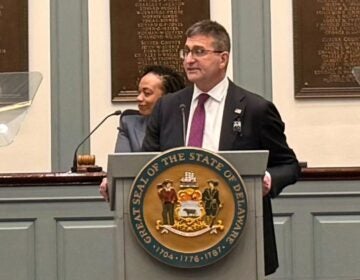A bill to fight expensive prison phone call costs heads to Biden’s desk

Prison inmates make one of their daily allotment of six phone calls at the York Community Reintegration Center. (John Moore/Getty Images)
Legislation that aims to curb the costs of phone calls behind bars is heading to President Biden’s desk for his signature.
The Martha Wright-Reed Just and Reasonable Communications Act of 2022, which was approved by Congress last month, is a major victory for the Federal Communications Commission in its yearslong fight to cap how much private companies charge incarcerated people for phone calls.
In a statement, FCC commissioner Geoffrey Starks called the newly passed legislation a “win for equity.”
“Jails and prisons have charged predatory rates to incarcerated individuals for far too long,” Starks said. “The FCC is poised to ensure that everyone has the ability to communicate.”
Though rates differ by state, calls from prison cost on average $5 for a 30-minute phone call. Those fees can place a serious financial burden on incarcerated people and their loved ones looking to maintain regular contact, which research suggests can reduce recidivism. The bill itself is named after Martha Wright, a retired nurse who became a prison reform advocate after noticing the expensive cost to stay in touch with her grandson.
Two main factors contribute to expensive phone call fees
One reason for high rates is that jails and prisons typically develop an exclusive contract with one telecommunications company. That means incarcerated people and their families are stuck with one provider even if the company charges high rates.
Another factor is site commissions, or kickbacks that county sheriffs or state corrections departments receive. Some local officials argue that site commissions are crucial to fund staff who will monitor inmate phone calls for any threats to the community.
Prison reform advocates and federal regulators have scrutinized both contributing factors. Today, states such as New York, Ohio and Rhode Island have outlawed site commissions while California and Connecticut have made prison calls free of charge.
This bill may overhaul the prison phone call industry
The FCC has had the jurisdiction to regulate the cost of calls between states, but not within state borders, which FCC chairwoman Jessica Rosenworcel has described as a “detrimental loophole.”
Back in 2015, the FCC voted to cap costs on in-state prison phone calls. But two years later, a federal court struck down those regulations, arguing that the FCC had no such authority.
This legislation may finally change that, giving federal regulators the control to address in-state rates and ensure “just and reasonable” charges.
Rosenworcel told NPR’s Weekend Edition that “just and reasonable” is not an abstract concept, but a legal term that the FCC has been using since the Communications Act of 1934.
“What it means is that those rates are fair and not discriminatory,” she said in October. “No matter who you are or where you live in this country, whether you’re incarcerated or not, you should be charged about the same to make some basic phone calls.”
9(MDAzMzI1ODY3MDEyMzkzOTE3NjIxNDg3MQ001))




